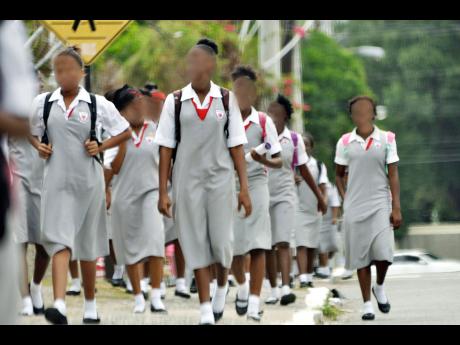When did our kids become 'gangsters'?
Week after week, the headlines in The Gleaner have become increasingly dismal for the Jamaican youth population. Issues such as child violence and child neglect/abuse have become constant contenders for the cover page and can even be found all throughout the entire paper.
In fact, just last Sunday, the cover page displayed a story speaking about at least eight students who were asked to leave The Queen's School, a leading St Andrew high school, because of gang violence which resulted in serious bodily harm to two students.
It is no wonder why this story was chosen for the front page. It had a variety of elements going for it. For starters, it was attention-grabbing. The title, 'Girl gangsters booted', did not fail to captivate one's interest. As soon as I read it, I was curious to indulge and read the article in its entirety. Also, the story had a certain shock value to it.
The term 'gangster' is normally reserved to males who have committed some form of illegal action. So, the mere fact that it stated that the perpetrators were female would also naturally make anyone want to find out what they did in order to be deserving of this notorious title.
However, while initially captivated by the article for obvious reasons, upon completing it, I felt a wave of uneasiness and sadness. As a mental-health practitioner, I found myself contemplating what an article like that would do for the rehabilitation of those young girls. Essentially, I wondered what happens when we label our youth derogatorily with disreputable terms such as 'gangster'. Does it help them to seek treatment for their obvious behavioural problems? Or does it instill the idea that they are inherently bad and cannot be 'fixed' or helped?
In my experience, I would opt for the latter, although I do not deny that the first can occur. Children and adolescents who are constantly labelled 'bad' tend to conform to the characterisation, unless an intervention is provided. Interventions can be quite powerful if they are implemented from the onset of when parents notice that their child is experiencing behavioural problems or other mental issues.
However, what tends to happen is that parents do not seek psychological help and services for their children until it is too late. They tend to ignore warning signs that could be indicative of a more serious problem such as constant irritability or anger, petty theft, missing of classes/school, or even continuous fighting.
Then, when their child's behaviour escalates, they are suddenly ready to seek help. This saddens me, as many of these more grievous incidents could have been averted if our young children were provided with adequate mental health care.
On the other hand, there are parents who do try their best to seek out mental-health care for their children. However, there are a number of factors that deter them from actually getting help for their children such as the cost of private psychological or psychiatric services, or the lack of resources in the public system.
Government organisations such as the Child Development Agency (CDA), which try to protect children from abuse and neglect, have extremely high caseloads. It is easy to cast blame on the Government and say it's not doing its best to help our children, but it is quite the opposite.
Despite this, something needs to change. This is evidenced by the alarming number of reports of child abuse and violent attacks being committed by our children and adolescents. The system, as it is, does not work as effectively as it needs to in order to deter children from partaking in crimes, or from being victims of horrible crimes either.
I honestly believe that what we need in Jamaica is a higher focus on mental-health care. We need to focus more on rehabilitation and treatment of our youth, rather than being quick to judge or label them. More psychological services need to be made available to the public in order to prevent some of these atrocities from occurring. If we fail to protect or rehabilitate our children for their wrongs, what future will we really have as a country?
- Amanda Fraser, MSc, is an associate clinical psychologist. Email feedback to columns@gleanerjm.com and amandagfraser@gmail.com.

